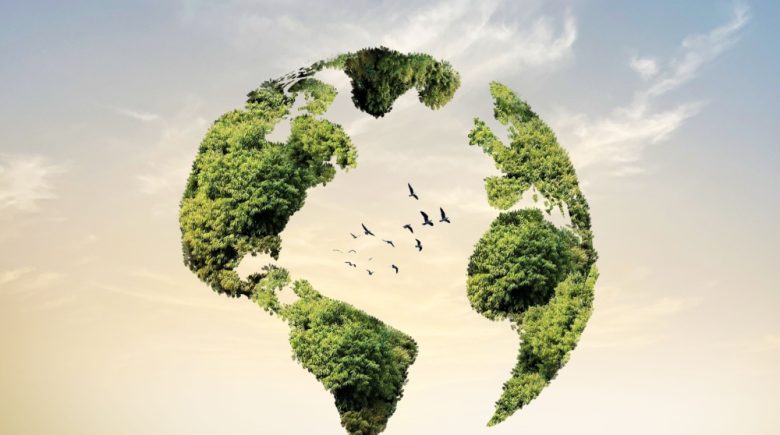Is it possible to find common ground on one of today’s most divisive issues—our changing environment?
We are bombarded with alarming headlines: coral reefs eroding, air thick with pollution, rivers drying up to the point that farmers question whether they can water their crops or livestock. These stories force us to ask: is the politicization of the environment a modern phenomenon, or has it been with us for centuries?
Climate Shifts Through History
Mary Robinson, former President of Ireland and UN High Commissioner for Human Rights, reminds us that climate change is nothing new. Earth has endured seven ice ages in the past 650,000 years. Civilizations have risen and fallen in response. The Mesoamericans thrived for three millennia before mysteriously disappearing. Angkor Wat’s great empire crumbled after destructive monsoons between 802 and 1431 CE. And in the Arctic, scientists recently uncovered camel remains preserved in permafrost—clear signs that climates can shift dramatically.
Despite today’s advanced technology, experts at the World Economic Forum warn that the conclusion is inescapable: dire consequences are inevitable unless action is taken.
A Fork in the Road
Robert Frost’s famous poem The Road Not Taken tells of choosing between two diverging paths. Environmentalists and climate skeptics alike now face the same crossroads.
According to the American Sociological Association, climate denial didn’t emerge solely under Donald Trump. Skepticism has deep roots, growing as the Republican Party shifted from Reagan-era conservatism to the populist right. Meanwhile, environmental advocates see themselves as stewards of the planet—pushing for societies that can adapt sustainably to rapid change, as described by the nonprofit Learning to Give.
Seeking the Middle Ground
In 2025, polarization on climate change is sharper than ever. But is it possible to respect both sides of the debate? If we seek out credible, nonpartisan research, the answer is yes.
Consider Environmental Voter.org (EV.org), a trusted think tank that tracks human impact on climate systems. They identify the Industrial Revolution as the turning point when industrial gases began heating the planet. Their research highlights at-risk ecosystems such as coastal areas, drought-prone farmlands, and polluted cities where survival becomes impossible for humans, animals, and crops.
Environmental Policy in the U.S.
Environmental concerns are not new in American politics. In his 1970 State of the Union Address, President Nixon declared: “Shall we make peace with nature and begin to make reparations for the damage we have done?” His administration created the Environmental Protection Agency (EPA) and the National Oceanic and Atmospheric Administration (NOAA), while the Clean Air Act of 1970 passed the Senate unanimously.
But momentum shifted under President Reagan, whose emphasis on deregulation and smaller government deepened partisan divides. By 2017, 88% of Democrats said they worried about global warming, compared to just 29% of Republicans. Still, many Republicans supported solutions: 56% wanted stronger corporate responsibility, nearly half supported CO2 regulations, and almost three-quarters favored funding renewable energy research.
What Americans Really Think
A 2025 EV.org survey of 3,250 adults reveals that climate change matters deeply across party lines:
- 18% think about climate change daily.
- 58% think about it weekly, compared to immigration (55%), gun violence (50%), or abortion (39%).
- 49% consider it “extremely” or “very important”—a higher priority than immigration (42%) or abortion (38%).
Interestingly, most respondents said they don’t view climate change as a political issue—unlike abortion or gun rights. Americans are also less likely to blame government policies for climate change than for other divisive issues.
Toward Balance
These findings challenge the idea that environmentalism is strictly partisan. If climate change truly transcends politics in the public’s mind, we may be moving toward a more balanced national conversation.
The debate is far from over, and new voices, theories, and movements emerge every day. Whether you lean left, right, or somewhere in between, the most important step is to stay informed—and keep your eye on the most consequential environmental developments shaping our shared future.
Is it possible to find common ground on one of today’s most divisive issues—our changing environment?
We are bombarded with alarming headlines: coral reefs eroding, air thick with pollution, rivers drying up to the point that farmers question whether they can water their crops or livestock. These stories force us to ask: is the politicization of the environment a modern phenomenon, or has it been with us for centuries?
Climate Shifts Through History
Mary Robinson, former President of Ireland and UN High Commissioner for Human Rights, reminds us that climate change is nothing new. Earth has endured seven ice ages in the past 650,000 years. Civilizations have risen and fallen in response. The Mesoamericans thrived for three millennia before mysteriously disappearing. Angkor Wat’s great empire crumbled after destructive monsoons between 802 and 1431 CE. And in the Arctic, scientists recently uncovered camel remains preserved in permafrost—clear signs that climates can shift dramatically.
Despite today’s advanced technology, experts at the World Economic Forum warn that the conclusion is inescapable: dire consequences are inevitable unless action is taken.
A Fork in the Road
Robert Frost’s famous poem The Road Not Taken tells of choosing between two diverging paths. Environmentalists and climate skeptics alike now face the same crossroads.
According to the American Sociological Association, climate denial didn’t emerge solely under Donald Trump. Skepticism has deep roots, growing as the Republican Party shifted from Reagan-era conservatism to the populist right. Meanwhile, environmental advocates see themselves as stewards of the planet—pushing for societies that can adapt sustainably to rapid change, as described by the nonprofit Learning to Give.
Seeking the Middle Ground
In 2025, polarization on climate change is sharper than ever. But is it possible to respect both sides of the debate? If we seek out credible, nonpartisan research, the answer is yes.
Consider Environmental Voter.org (EV.org), a trusted think tank that tracks human impact on climate systems. They identify the Industrial Revolution as the turning point when industrial gases began heating the planet. Their research highlights at-risk ecosystems such as coastal areas, drought-prone farmlands, and polluted cities where survival becomes impossible for humans, animals, and crops.
Environmental Policy in the U.S.
Environmental concerns are not new in American politics. In his 1970 State of the Union Address, President Nixon declared: “Shall we make peace with nature and begin to make reparations for the damage we have done?” His administration created the Environmental Protection Agency (EPA) and the National Oceanic and Atmospheric Administration (NOAA), while the Clean Air Act of 1970 passed the Senate unanimously.
But momentum shifted under President Reagan, whose emphasis on deregulation and smaller government deepened partisan divides. By 2017, 88% of Democrats said they worried about global warming, compared to just 29% of Republicans. Still, many Republicans supported solutions: 56% wanted stronger corporate responsibility, nearly half supported CO2 regulations, and almost three-quarters favored funding renewable energy research.
What Americans Really Think
A 2025 EV.org survey of 3,250 adults reveals that climate change matters deeply across party lines:
- 18% think about climate change daily.
- 58% think about it weekly, compared to immigration (55%), gun violence (50%), or abortion (39%).
- 49% consider it “extremely” or “very important”—a higher priority than immigration (42%) or abortion (38%).
Interestingly, most respondents said they don’t view climate change as a political issue—unlike abortion or gun rights. Americans are also less likely to blame government policies for climate change than for other divisive issues.
Toward Balance
These findings challenge the idea that environmentalism is strictly partisan. If climate change truly transcends politics in the public’s mind, we may be moving toward a more balanced national conversation.
The debate is far from over, and new voices, theories, and movements emerge every day. Whether you lean left, right, or somewhere in between, the most important step is to stay informed—and keep your eye on the most consequential environmental developments shaping our shared future.



